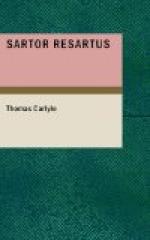Let the friends of social order, in such a disastrous period, lay this to heart, and derive from it any little comfort they can. We subjoin another passage, concerning Titles:—
“Remark, not without surprise,” says Teufelsdrockh, “how all high Titles of Honor come hitherto from Fighting. Your Herzog (Duke, Dux) is Leader of Armies; your Earl (Jarl) is Strong Man; your Marshal cavalry Horse-shoer. A Millennium, or reign of Peace and Wisdom, having from of old been prophesied, and becoming now daily more and more indubitable, may it not be apprehended that such Fighting titles will cease to be palatable, and new and higher need to be devised?
“The only Title wherein I, with confidence, trace eternity is that of King. Konig (King), anciently Konning, means Ken-ning (Cunning), or which is the same thing, Can-ning. Ever must the Sovereign of Mankind be fitly entitled King.”
“Well, also,” says he elsewhere, “was it written by Theologians: a King rules by divine right. He carries in him an authority from God, or man will never give it him. Can I choose my own King? I can choose my own King Popinjay, and play what farce or tragedy I may with him: but he who is to be my Ruler, whose will is to be higher than my will, was chosen for me in Heaven. Neither except in such Obedience to the Heaven-chosen is Freedom so much as conceivable.”
The Editor will here admit that, among all the wondrous provinces of Teufelsdrockh’s spiritual world, there is none he walks in with such astonishment, hesitation, and even pain, as in the Political. How, with our English love of Ministry and Opposition, and that generous conflict of Parties, mind warming itself against mind in their mutual wrestle for the Public Good, by which wrestle, indeed, is our invaluable Constitution kept warm and alive; how shall we domesticate ourselves in this spectral Necropolis, or rather City both of the Dead and of the Unborn, where the Present seems little other than an inconsiderable Film dividing the Past and the Future? In those dim long-drawn expanses, all is so immeasurable; much so disastrous, ghastly; your very radiances and straggling light-beams have a supernatural character. And then with such an indifference, such a prophetic peacefulness (accounting the inevitably coming as already here, to him all one whether it be distant by centuries or only by days), does he sit;—and live, you would say, rather in any other age than in his own! It is our painful duty to announce, or repeat, that, looking into this man, we discern a deep, silent, slow-burning, inextinguishable Radicalism, such as fills us with shuddering admiration.




